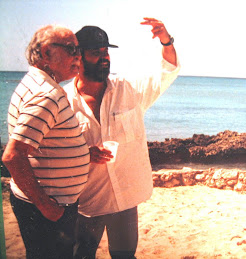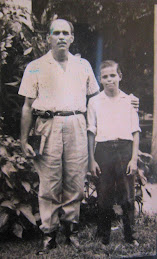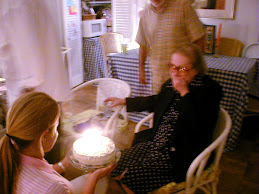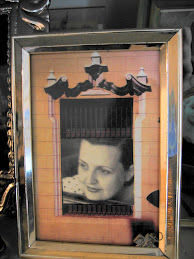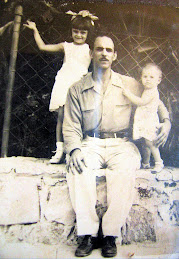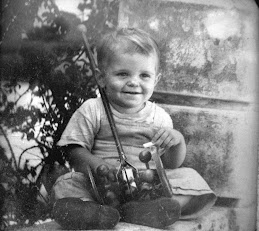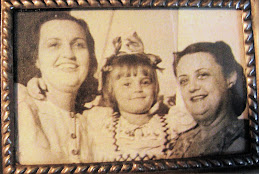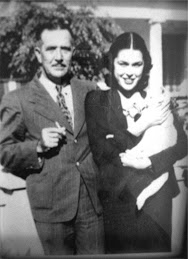

One of a kind parents: Tarzan and the Virgin Bride
by Mari Rodríguez Ichaso
In Cuba, having one-of-a-kind parents was not always 'fun'. Something that did not always help in the social game we all had to play.
The fact that my father --Dr. Justo Rodriguez Santos-- was a poet and a raving genius, and my mother Antonia Ichaso Macías, a stunning soap-opera writer who came from a respected family of writers and journalists, placed me into a distinct "category" among my schoolmates and acquaintances.
It was a fact: I was definitely "different" and my family definitely... "bohemian". And this was not the norm!
Most of my friend's fathers were what I always called '9 to 5 people' --men who dressed elegantly in impeccable suits and ties, and followed conservative schedules (bankers, medical doctors, lawyers, business owners, etc, etc). Most of their mothers were simply 'mothers and wives' -and did not work. Or -if they did- they were mostly teachers, secretaries -or even ballet instructors.
Mine were totally different!
My father was considered an eccentric. An artist. Sort of a gypsy, who dressed in blue jeans, hawaiian jungle-printed cotton shirts and tennis shoes -- 50 years ago! A blue-eyed, long haired individual who rode a motorcycle, while talking to himself, through the streets of Havana ---and wrote magnificent sonnets. Also a pioneer of Cuban Radio and Television. And one of the most creative advertising men ever!
Like many Spaniards did at the end of the century, looking for better opportunities in Cuba (the wealthiest of Spains's colonies at the times) --my father's father had come from the mountains of Asturias in Northern Spain to Cuba's Oriente province, where he worked very hard and made loads of money. In the midst of a very business oriented and non-intellectual family, 'papi' refused to follow in his fathers's steps. He would not be a 'businessman' nor a “comerciante” ---but a poet! The crazy thoughts of his eldest son did not amuse my very dapper Grandfather Justo (pictures of his youth show this Beau Brummell of a man) --who had lost most of his fortune during the crash of the American Stock Market in 1929 --thus becoming bitter and sullen for the rest of his life. But since he had made his fortune in ‘commerce’, representing American companies in Cuba --like Singer Sewing Machines and Griffith’s Shinola--he wanted my father to follow the same route.
“It is so demented to think a man can earn a living as a poet” --he used to say-- “A man needs to provide for his family!”.
My grandfather had done that, buying a beautiful house with a tennis court for his wife and 4 children --and despite the Stock Market ‘debacle’-- was very proud of his achievements in his adopted country. But my father never considered another possibility -- thus, he simply dropped out of High School to write poetry --and become a member of the Swimming Team at Havana’s “Miramar Yacht Club”.
This is where my mother met him. He had just come out of the ocean, dripping salt water, witty, irreverent and filled with 'joie de vivre', as he recited poems to all the girls on the beach! She was as beautiful as he was handsome. My mother -who was always being compared to the Hollywood movie stars of the 30 and 40's - at age 18 was the epitome of a Hurrell portrait! My father at 20 was quite the beach-bum, a blue-eyed blonde with a perpetual tan and little regard for 'bourgeois' conventionalisms. He dazzled her. She inspired him. Although they came from very different backgrounds and wanted very different things from life, they fell in love. Tarzan and the Virgin Bride.
While my father abhorred religion and had never been particularly close to his family -- Mami came from a tight knitted, conservative Catholic family. Together with her older brother and three older sisters, she was raised in a very happy and levelheaded home, under the helm of my Basque Grandfather --Leon Ichaso, quite a celebrity in Cuban intellectuals circles --and my beloved Grandmother Rafaela Macias.
Mami, the youngest of the Ichaso’s -a distinguished family of writers and journalists, with less money than my father’s, but more social relevance -- was extremely close to her parents and siblings. My grandfather León Ichaso, whom I never met because he died in Havana in 1938, during the days of the Spanish Civil War (where most of his relatives had been killed by the Communists) was a graduate of Spain’s prestigious University of Salamanca and one of the favorite students of famed Spanish writer and philosopher Miguel de Unamuno. He also had been an ‘almost ex-priest’!
Forced by his parents to be ‘the priest’ of the family (something very common in Spain, where one son would be ‘in the military’ and another was offered ‘to the church’), my grandfather studied in the Loyola Seminary near San Sebastian and then in Salamanca ---just to back-out from priesthood just three days before taking his final vows!
“I liked women too much” --was his explanation.
A few days later -his hair freshly cropped in the middle, as the ceremony demanded in young priests! -- he was shipped out to Cuba. It was the only way to avert the dishonor his decision would stumble on his parents! In his new country he worked as a teacher, playwright and journalist, sometimes holding 3 and 4 jobs at a time, until he became Sub-Director of the famous newspaper El Diario de la Marina, (equivalent of The New York Times in Cuba). I always wish I had met him, since he must have been quite an interesting and intelligent man, and everyone who ever met him just ‘adored’ him! Apparently he was like most Basques: vigorous, charismatic and forthright --and he taught his children the merits of hard work and the importance of having high moral values. His wife --my grandmother Rafaela-- was tall, funny and madly in love with him until the last day of his life. Later on, she came to live with us, and I remember her as the archtype of a ‘grandmother’. Sympathetic, generous and always concerned about her grandchildren’s whereabouts and welfare.
Thus, growing up with this heritage --and this set of parents-- marked our lives forever.
Mami was beautiful but never a vain nor superficial woman --and the tales of her youth project a ‘naive’ but determined young woman filled with dreams of a family and children of her own.
Her male ‘enamorados’ found her stunning and intelligent, but falling in love was difficult to her ---until that fateful day at the beach. Much older and ‘debonnaire’ Dr. E.C, the charming dentist who later treated all of us, was madly in love with her --and Mami loved going out with him to night clubs and beautiful balls, but --she later told me-- “there was never ‘magic’ in their relationship”. In a small private ‘ladies school’ called “El Angel de la Guarda”, she learned a very definite set of values and -to this day- “white is white and black is black” --and she does not compromise. This was also learned at home, where my grandfather Leon --although very ‘democratic’ and with a wonderful sense of humor -- was 100% headstrong and resolute about his beliefs. Just like Mami and all her siblings!
When I see my mothers’s pictures of those years I am at awe of her drop-dead beauty. Tall, dark hair, dark almond-shaped eyes, immensily long eyelashes, translucent white skin and a radiant smile. They also sadden me, because they show a happy woman who expected so much from the future! When she met my very good looking and unconventional father, her life took a wild turn --and ever since they tried to understand each other and get along!
Her love for him continued until my father’s unexpected death at age 83 --such a painful blow that she cannot accept it to this day. You see, there were together practically all her life. Mami made papi finish his studies, since it was out of the question she would marry a 'non professional'. Hence, their 7 years engagement, until ‘papi’ finally graduated from the University of Havana, earning a PhD in Philosophy he would never use to earn a living.
They married against the judicious opinions of both their families --and settled into a small apartment in Industria St. in the center of old Havana. It was 1942 --and the Second World War, together with a vast sugar crop-- was filling up Cuba's vaults, enriching even more the already prosperous nation. Soon after, my father got a very advantageous job writing soaps and adventure radio shows for RHC Cadena Azul radio --as he continued writing poetry 'on the side'!
Newly married, their circle of friends never included other "married couples", but a myriad of poets, writers, painters and sculptors, who would later become Cuba's most famous intellectuals and artists. Legendary poet Jose Lezama Lima --author of "Paradiso", one of the greatest novels written in Spanish in this century-- was one of them-- and 'papi' one of the founding members of his highly respected literary magazine "Origenes", which became a symbol of the grand state of Cuban Literature in the 40's. Emilio Ballagas, Gaston Baquero, Mariano Brull, Eugenio Florit, Cintio Vitier, Eliseo Diego, Angel Gaztelu, Octavio Smith, they all visited the house regularly, sharing thoughts until very late at night ---and I was lucky to grow up listening to these fascinating conversations.
The many artists who were beginning their careers at the time gave my parents as wedding presents many paintings and sculptures. Works of art which, many years later would become very valuable. Many of these paintings -confiscated by the Cuban Revolution as families left the country- would later show up at auction in places like Sotheby's and Christie's and bring their new illegal 'owners' thousands of dollars!
Cundo Bermudez, Mariano Rodriguez, Portocarrero, Mijares, Victor Manuel, Mirta Serra, Amelia Pelaez and Mario Carreño made my house as unconventional as my parents, since it was filled with dozens of their modern paintings, together with thousands of books and the most exotic of tropical plants. Instead of having the 'expected' decoration and furniture my home was --again!-- "very bohemian", as people always referred to us and our surroundings -- which included a jungle-like garden with 'papi's favorite 'Yagruma', a gigantic tree with rare huge leaves, colored with what looked like 'hand painted' white designs!.
I still don't understand why we seemed so "different" to the others --and why (to this day!) my friends tell me about the "freedom they tasted" every time they visited my house. Mami was very conservative and tried her best to run a normal and ordinary household. As was expected, both my brother and I went to private catholic schools. We both had our 'manejadoras', or 'nannies', dressed in the required white uniforms, who took us to play at the beach club and the park. Like everybody else's our cook served freshly cooked meals twice a day, which were served at table -- if not in the company of both our parents, at least with Mami present. We went to mass --without fail-- every Sunday. We visited our relatives and interacted normally with friends and neighbors. Thus, I always wanted to think that our daily routine was typical of the life of a family of professionals in Cuba's high-middle class.
But we were a family of "intellectuals" --and in our "Brave New World" test-tubes, the infamous drop of water had changed the uniformity of the 'formula'!
I always wanted to be like my friends though! Although now I laugh about it and even brag about my unusual upbringing, 'papi' used to embarass me very much when --every time he drove me to school-- he would start speaking to himself -out loud!- and used his fingers to count the verses of the surrealist poems he was writing in his mind, as he drove along the city.
"One, two three, four....One, two, three four" - he would say, moving his fingers up and down concocting a new sonnet - "One, two, three, four..."
It was all so crazy! I remember talking out loud to myself every time he stopped the car for a red light --pretending 'papi' and I were happily talking to each other, carrying “a conversation” like a normal family -- and hoping the people in nearby cars did not notice the unusual circumstances of out mutual monologues!
As the Radio and TV industries developed in Cuba in the 40’s and 50’s, my father's career blossomed and brought our family quite a comfortable lifestyle. Papi became Director of Advertising for Sterling Products Inc, creating famous slogans for their products and producing TV programs for them.
"Mejor Mejora Mejoral" --was one of them. While "Si Su Pelo Hablara Pediría Glostora" (If Your Hair Could Speak, It Would Ask for Glostora), created to sell a popular hair 'brilliantine' of the 50's, showed his poetic surrealistic imagery at its best!
At this point of their lives, as money poured in, Mami started helping papi writing some of the many radio soap operas he was asked to do. They were broadcasted in Cuba and all over Latin America --and later on some were made into Mexican movies. While he wrote the extremely popular "Carcel de Mujeres" (Women's Jail) and "Misterios del Mas Alla" (Misteries of the Unknown), she wrote "Hospital General" and "Histories of a Madhouse"--although her name never appeared in the credits, as it corresponded to a good, self-effacing wife.
When we moved to the our brand new house in Miramar in 1950, my father was making over $2,000 a month --doing the advertising and directing and producing TV programs for clients like Bacardi, Dodge & Chrysler and Gilette-- salary that at the time was a huge amount of money. But instead of buying real estate, giving my mother jewels and furs, or saving it, after expenses were paid -- my father enjoyed life to the hilt, partied day and night and spent it all!
In Cuba, having one-of-a-kind parents was not always 'fun'. Something that did not always help in the social game we all had to play.
The fact that my father --Dr. Justo Rodriguez Santos-- was a poet and a raving genius, and my mother Antonia Ichaso Macías, a stunning soap-opera writer who came from a respected family of writers and journalists, placed me into a distinct "category" among my schoolmates and acquaintances.
It was a fact: I was definitely "different" and my family definitely... "bohemian". And this was not the norm!
Most of my friend's fathers were what I always called '9 to 5 people' --men who dressed elegantly in impeccable suits and ties, and followed conservative schedules (bankers, medical doctors, lawyers, business owners, etc, etc). Most of their mothers were simply 'mothers and wives' -and did not work. Or -if they did- they were mostly teachers, secretaries -or even ballet instructors.
Mine were totally different!
My father was considered an eccentric. An artist. Sort of a gypsy, who dressed in blue jeans, hawaiian jungle-printed cotton shirts and tennis shoes -- 50 years ago! A blue-eyed, long haired individual who rode a motorcycle, while talking to himself, through the streets of Havana ---and wrote magnificent sonnets. Also a pioneer of Cuban Radio and Television. And one of the most creative advertising men ever!
Like many Spaniards did at the end of the century, looking for better opportunities in Cuba (the wealthiest of Spains's colonies at the times) --my father's father had come from the mountains of Asturias in Northern Spain to Cuba's Oriente province, where he worked very hard and made loads of money. In the midst of a very business oriented and non-intellectual family, 'papi' refused to follow in his fathers's steps. He would not be a 'businessman' nor a “comerciante” ---but a poet! The crazy thoughts of his eldest son did not amuse my very dapper Grandfather Justo (pictures of his youth show this Beau Brummell of a man) --who had lost most of his fortune during the crash of the American Stock Market in 1929 --thus becoming bitter and sullen for the rest of his life. But since he had made his fortune in ‘commerce’, representing American companies in Cuba --like Singer Sewing Machines and Griffith’s Shinola--he wanted my father to follow the same route.
“It is so demented to think a man can earn a living as a poet” --he used to say-- “A man needs to provide for his family!”.
My grandfather had done that, buying a beautiful house with a tennis court for his wife and 4 children --and despite the Stock Market ‘debacle’-- was very proud of his achievements in his adopted country. But my father never considered another possibility -- thus, he simply dropped out of High School to write poetry --and become a member of the Swimming Team at Havana’s “Miramar Yacht Club”.
This is where my mother met him. He had just come out of the ocean, dripping salt water, witty, irreverent and filled with 'joie de vivre', as he recited poems to all the girls on the beach! She was as beautiful as he was handsome. My mother -who was always being compared to the Hollywood movie stars of the 30 and 40's - at age 18 was the epitome of a Hurrell portrait! My father at 20 was quite the beach-bum, a blue-eyed blonde with a perpetual tan and little regard for 'bourgeois' conventionalisms. He dazzled her. She inspired him. Although they came from very different backgrounds and wanted very different things from life, they fell in love. Tarzan and the Virgin Bride.
While my father abhorred religion and had never been particularly close to his family -- Mami came from a tight knitted, conservative Catholic family. Together with her older brother and three older sisters, she was raised in a very happy and levelheaded home, under the helm of my Basque Grandfather --Leon Ichaso, quite a celebrity in Cuban intellectuals circles --and my beloved Grandmother Rafaela Macias.
Mami, the youngest of the Ichaso’s -a distinguished family of writers and journalists, with less money than my father’s, but more social relevance -- was extremely close to her parents and siblings. My grandfather León Ichaso, whom I never met because he died in Havana in 1938, during the days of the Spanish Civil War (where most of his relatives had been killed by the Communists) was a graduate of Spain’s prestigious University of Salamanca and one of the favorite students of famed Spanish writer and philosopher Miguel de Unamuno. He also had been an ‘almost ex-priest’!
Forced by his parents to be ‘the priest’ of the family (something very common in Spain, where one son would be ‘in the military’ and another was offered ‘to the church’), my grandfather studied in the Loyola Seminary near San Sebastian and then in Salamanca ---just to back-out from priesthood just three days before taking his final vows!
“I liked women too much” --was his explanation.
A few days later -his hair freshly cropped in the middle, as the ceremony demanded in young priests! -- he was shipped out to Cuba. It was the only way to avert the dishonor his decision would stumble on his parents! In his new country he worked as a teacher, playwright and journalist, sometimes holding 3 and 4 jobs at a time, until he became Sub-Director of the famous newspaper El Diario de la Marina, (equivalent of The New York Times in Cuba). I always wish I had met him, since he must have been quite an interesting and intelligent man, and everyone who ever met him just ‘adored’ him! Apparently he was like most Basques: vigorous, charismatic and forthright --and he taught his children the merits of hard work and the importance of having high moral values. His wife --my grandmother Rafaela-- was tall, funny and madly in love with him until the last day of his life. Later on, she came to live with us, and I remember her as the archtype of a ‘grandmother’. Sympathetic, generous and always concerned about her grandchildren’s whereabouts and welfare.
Thus, growing up with this heritage --and this set of parents-- marked our lives forever.
Mami was beautiful but never a vain nor superficial woman --and the tales of her youth project a ‘naive’ but determined young woman filled with dreams of a family and children of her own.
Her male ‘enamorados’ found her stunning and intelligent, but falling in love was difficult to her ---until that fateful day at the beach. Much older and ‘debonnaire’ Dr. E.C, the charming dentist who later treated all of us, was madly in love with her --and Mami loved going out with him to night clubs and beautiful balls, but --she later told me-- “there was never ‘magic’ in their relationship”. In a small private ‘ladies school’ called “El Angel de la Guarda”, she learned a very definite set of values and -to this day- “white is white and black is black” --and she does not compromise. This was also learned at home, where my grandfather Leon --although very ‘democratic’ and with a wonderful sense of humor -- was 100% headstrong and resolute about his beliefs. Just like Mami and all her siblings!
When I see my mothers’s pictures of those years I am at awe of her drop-dead beauty. Tall, dark hair, dark almond-shaped eyes, immensily long eyelashes, translucent white skin and a radiant smile. They also sadden me, because they show a happy woman who expected so much from the future! When she met my very good looking and unconventional father, her life took a wild turn --and ever since they tried to understand each other and get along!
Her love for him continued until my father’s unexpected death at age 83 --such a painful blow that she cannot accept it to this day. You see, there were together practically all her life. Mami made papi finish his studies, since it was out of the question she would marry a 'non professional'. Hence, their 7 years engagement, until ‘papi’ finally graduated from the University of Havana, earning a PhD in Philosophy he would never use to earn a living.
They married against the judicious opinions of both their families --and settled into a small apartment in Industria St. in the center of old Havana. It was 1942 --and the Second World War, together with a vast sugar crop-- was filling up Cuba's vaults, enriching even more the already prosperous nation. Soon after, my father got a very advantageous job writing soaps and adventure radio shows for RHC Cadena Azul radio --as he continued writing poetry 'on the side'!
Newly married, their circle of friends never included other "married couples", but a myriad of poets, writers, painters and sculptors, who would later become Cuba's most famous intellectuals and artists. Legendary poet Jose Lezama Lima --author of "Paradiso", one of the greatest novels written in Spanish in this century-- was one of them-- and 'papi' one of the founding members of his highly respected literary magazine "Origenes", which became a symbol of the grand state of Cuban Literature in the 40's. Emilio Ballagas, Gaston Baquero, Mariano Brull, Eugenio Florit, Cintio Vitier, Eliseo Diego, Angel Gaztelu, Octavio Smith, they all visited the house regularly, sharing thoughts until very late at night ---and I was lucky to grow up listening to these fascinating conversations.
The many artists who were beginning their careers at the time gave my parents as wedding presents many paintings and sculptures. Works of art which, many years later would become very valuable. Many of these paintings -confiscated by the Cuban Revolution as families left the country- would later show up at auction in places like Sotheby's and Christie's and bring their new illegal 'owners' thousands of dollars!
Cundo Bermudez, Mariano Rodriguez, Portocarrero, Mijares, Victor Manuel, Mirta Serra, Amelia Pelaez and Mario Carreño made my house as unconventional as my parents, since it was filled with dozens of their modern paintings, together with thousands of books and the most exotic of tropical plants. Instead of having the 'expected' decoration and furniture my home was --again!-- "very bohemian", as people always referred to us and our surroundings -- which included a jungle-like garden with 'papi's favorite 'Yagruma', a gigantic tree with rare huge leaves, colored with what looked like 'hand painted' white designs!.
I still don't understand why we seemed so "different" to the others --and why (to this day!) my friends tell me about the "freedom they tasted" every time they visited my house. Mami was very conservative and tried her best to run a normal and ordinary household. As was expected, both my brother and I went to private catholic schools. We both had our 'manejadoras', or 'nannies', dressed in the required white uniforms, who took us to play at the beach club and the park. Like everybody else's our cook served freshly cooked meals twice a day, which were served at table -- if not in the company of both our parents, at least with Mami present. We went to mass --without fail-- every Sunday. We visited our relatives and interacted normally with friends and neighbors. Thus, I always wanted to think that our daily routine was typical of the life of a family of professionals in Cuba's high-middle class.
But we were a family of "intellectuals" --and in our "Brave New World" test-tubes, the infamous drop of water had changed the uniformity of the 'formula'!
I always wanted to be like my friends though! Although now I laugh about it and even brag about my unusual upbringing, 'papi' used to embarass me very much when --every time he drove me to school-- he would start speaking to himself -out loud!- and used his fingers to count the verses of the surrealist poems he was writing in his mind, as he drove along the city.
"One, two three, four....One, two, three four" - he would say, moving his fingers up and down concocting a new sonnet - "One, two, three, four..."
It was all so crazy! I remember talking out loud to myself every time he stopped the car for a red light --pretending 'papi' and I were happily talking to each other, carrying “a conversation” like a normal family -- and hoping the people in nearby cars did not notice the unusual circumstances of out mutual monologues!
As the Radio and TV industries developed in Cuba in the 40’s and 50’s, my father's career blossomed and brought our family quite a comfortable lifestyle. Papi became Director of Advertising for Sterling Products Inc, creating famous slogans for their products and producing TV programs for them.
"Mejor Mejora Mejoral" --was one of them. While "Si Su Pelo Hablara Pediría Glostora" (If Your Hair Could Speak, It Would Ask for Glostora), created to sell a popular hair 'brilliantine' of the 50's, showed his poetic surrealistic imagery at its best!
At this point of their lives, as money poured in, Mami started helping papi writing some of the many radio soap operas he was asked to do. They were broadcasted in Cuba and all over Latin America --and later on some were made into Mexican movies. While he wrote the extremely popular "Carcel de Mujeres" (Women's Jail) and "Misterios del Mas Alla" (Misteries of the Unknown), she wrote "Hospital General" and "Histories of a Madhouse"--although her name never appeared in the credits, as it corresponded to a good, self-effacing wife.
When we moved to the our brand new house in Miramar in 1950, my father was making over $2,000 a month --doing the advertising and directing and producing TV programs for clients like Bacardi, Dodge & Chrysler and Gilette-- salary that at the time was a huge amount of money. But instead of buying real estate, giving my mother jewels and furs, or saving it, after expenses were paid -- my father enjoyed life to the hilt, partied day and night and spent it all!
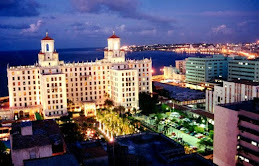
+azul.jpg)







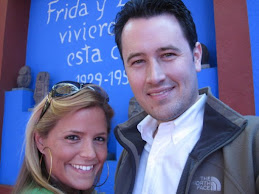.jpg)
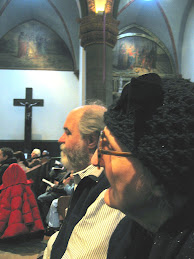

















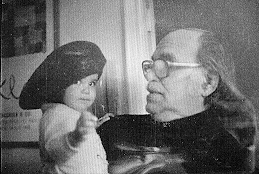.jpg)



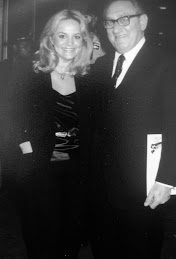.jpg)

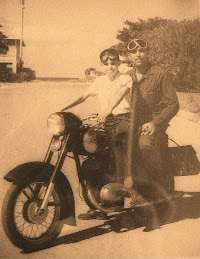.jpg)










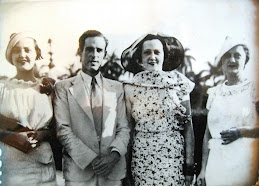

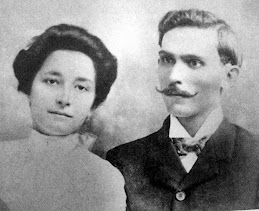
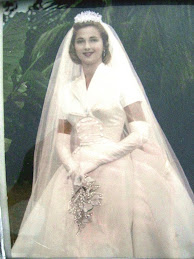
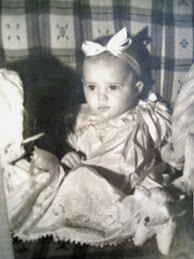
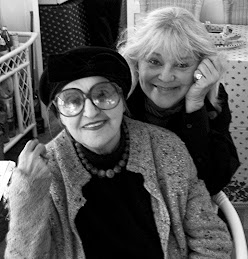
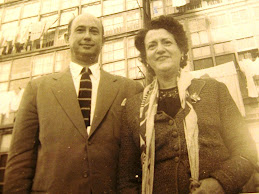
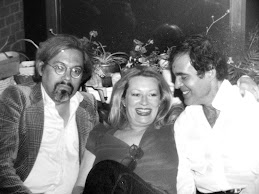
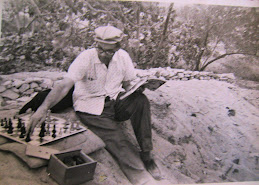
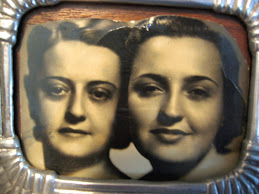
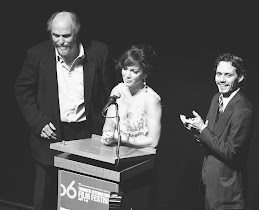
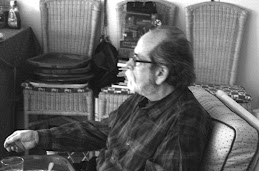
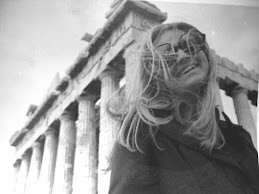

.jpg)

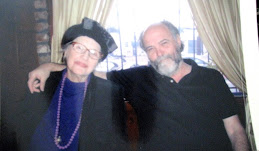
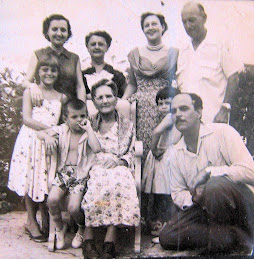
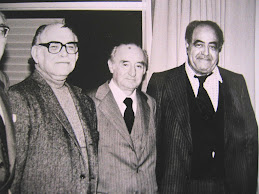
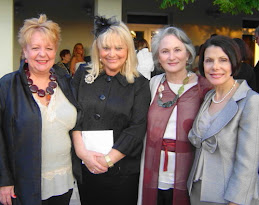

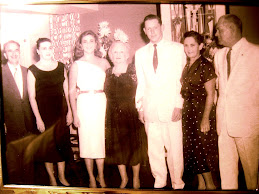
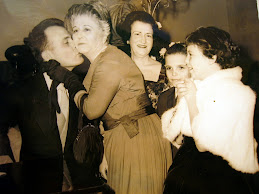
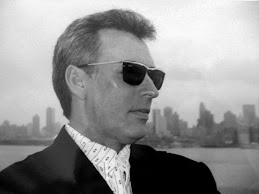
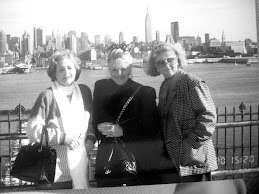

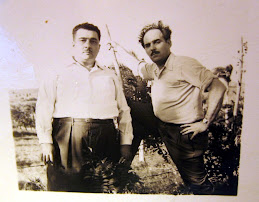
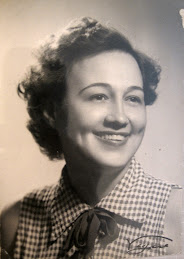
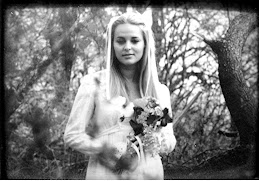
.jpg)
